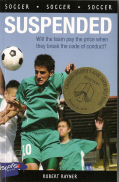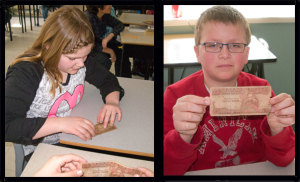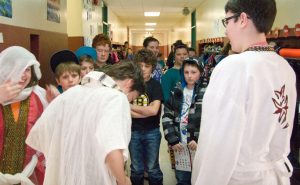Robert Rayner's Blog, page 10
June 5, 2014
Beginnings and Endings (2)

“You’ll never get away with that,” said Nancy R., laughing as I read the end of a draft of Suspended to her.
I have trouble with endings. Not with writing them, but having them approved by editors. My endings tend toward the ambivalent, or the downright bleak, and editors, at least of YA fiction, usually seem to want something at least a little uplifting or optimistic.
Hence Nancy’s response to the last sentence of Suspended (J. Lorimer 2010), the fourth novel in the Brunswick Valley series, knowing how I’d struggled in the past to finish YA stories on an acceptable note. It’s not a bleak or ambivalent ending, but it could be deemed borderline subversive.
Here’s the backstory: Shay, who lives with his grandfather, is in serious trouble at school for leading a revolt against the school’s code of conduct, a revolt in which he and his followers systematically and deliberately broke every rule in the code. Knowing retribution is coming, he confesses all to his grandfather. Shay is the narrator.
“Come round here where I can see you,” said Grandad.
I stood in front of him.
“So – because you thought those rules were an infringement of personal expression, and were unfair to struggling students, and stopped you having a little fun, you took it upon yourself to deliberately break them, and you led your friends to do the same.”
I hung my head. “Yes.”
“And although you knew right from the start that your protest was going to land your friends, as well as yourself, in serious trouble … you still led a kind of doomed rebellion.”
“Yes,” I whispered.
He stood slowly and put his hands on my shoulders.
“That’s good,” he said. “I’m proud of you.”


May 30, 2014
Beginnings and Endings
Stories and music performances have this in common: With a good beginning and a good ending – you can get away with rubbish in the middle.
Not true, of course. But a good beginning and ending certainly help disguise a few shortcomings in between.
With this in mind – i.e. the importance of beginnings and endings – I thought from time to time I’d share some of my favourites from my stories.
So here’s the end of Out of Sight (James Lorimer & Co. 2011). In the story, Brunswick Valley School soccer team’s fantastic goalkeeper, Flyin’ Brian (Flyin’ because of how he throws himself around his goal making amazing saves) is losing his eyesight to Lieber’s Disease. His friend and teammate, Linh-Mai, watches helplessly as he goes through stages of disbelief, rage, and despair. By the end of the story he can see very little. He’s just played his last game in goal, and Linh-Mai is watching anxiously as he trails after the rest of the team, who are setting off for end-of-season pizza. Mr. Price, Brian’s father, is watching, too.
… Brian was on the other side of the schoolyard, walking slowly with his head down. As Linh-Mai looked back, she noticed Mr. Price close by in the shadows at the foot of the steps by the main door.
He murmured, “Will he be all right? Does he need me to stay and look out for him?”
Linh-Mai, not knowing how to answer, not even sure whether he was talking to himself or to her, hovered uncertainly.
Mr. Price seemed suddenly to become aware of her and muttered, “You’ll see he gets to the pizza place, will you? And see he gets home safely?”
She stepped into the shadows beside him and whispered, “Yes,” as Brian approached.
“You’ll take care of him, eh?”
“Yes.” Another whisper.
Mr. Price murmured, “I don’t want him to know I’m worrying about him. He doesn’t want that.” He loped up the steps, eased the door open, and slipped stealthily inside.
Brian peered into the shadows where Linh-Mai waited. “Who’s that?”
She moved into the light. “It’s me.”
“What are you doing?”
“Waiting for you. I thought we could walk to Pizza Café together.”
“I don’t need looking after.”
“I know.”
“So why are you waiting?”
“Because we’re friends. Come on. Let’s catch up with the others.” Linh-Mai jogged forward.
Brian said, “Wait. I … I can’t see too much when it’s dark like this.”
She held her hand toward him.
He hesitated, took it, and they set off together.


May 22, 2014
Desperado
May 18, 2014
Florenceville



Early Friday morning driving north to New Brunswick’s potato country, en route stopping briefly to worship at the shrine, a.k.a. the factory, of Covered Bridge Chips, best potato chips in the world (not sure I could handle lobster flavoured chips, though), and passing
through the longest covered bridge in the world (seems to have been a morning of superlatives) at bustling-on-a-Friday-morning Hartland, headlights on and wait because
you don’t want to meet another vehicle half way through the bridge’s 1282 feet length and have to back up, and through immaculately ploughed and patterned fields awaiting potato
planting, to the lovely little town of Florenceville, French Fry Capital of the World, strung out along the Saint John River, McCain Foods its heart and soul, to spend the day talking about writing, and reading passages from the books, and singing the Libby and Toby songs with Florenceville Middle School and Elementary School students, to whom I send renewed thanks for being such a welcoming, lively, interested, polite and enthusiastic audience, at the same time as I send thanks also to the teachers for their welcome and hospitality, and to McCain’s for sponsoring a fun, exciting, stimulating and memorable day. (That’s fun, exciting, stimulating and memorable for me; hope it was for the students, too.)


May 10, 2014
Postcard from Marco Island Beach.

Flesh, too much, from taut and toned to sag and flab, from scaly leather to scorched pink to sun-virginal white. Men in skimpy swimwear who should know better. Ditto women in bikinis. A man bobbing and weaving to photograph a tanned, flabby, thirty-five-going-on-forty-five woman in a black, gold-spangled bikini striking model poses quasi Sports Illustrated Swimsuit Edition (leaning forward hands on knees, then on tiptoe with arms stretched wide – look at me! – then absurdly and precariously on one leg) all the time with a fixed and desperate smile, comical and grotesque and ridiculous and so, so sad. The morning beach like a freshly groomed ski trail after being mysteriously dragged overnight. A seventy-something man, skin like polished rosewood, thatch of white hair, thick white sideburns, paunch and jowls, tripping along the waters edge in tiny red Speedos. Self-righteous strutting look-at-me beach walkers all jutting elbows and arms pumping at the carefully correct angle. A middle-aged man with beach cart and beach umbrella and beach mat and beach chair and carefully wrapped picnic sitting alone all afternoon. Snowy egrets, reddish egrets, sandpipers, turnstones picking along the waters edge disregarding people. Terns dipping and kamikaze-ing into inches of water. Pelicans cruising effortlessly. Sunsets like evensong.


May 3, 2014
Postcard from Marco Island, Florida


Canals and waterways, boats docked behind houses. Sunset Grill at the Apollo a black and white movie set (except for the sunsets). Squadrons of pelicans cruising in formation without a stir of wing. White egrets, poised, elegant, and ruthless. Scurrying sandpipers. Burrowing owls nesting on a street corner. Stunning sunsets across the Gulf watched in reverent silence from the beach. Gated communities, security guards at the gates. Faux Spanish neo-colonial architecture. Nearly as much Spanish as U.S.-English spoken. Blatant fecundity everywhere almost obscene after the slop end of a five month winter in New Brunswick with snow and ice still knee deep in the woods and in patches like cement beside the road and rivers at sleepless night flood level.


April 24, 2014
Mr. Fitch
Here’s a gentle little children’s story I wrote some years ago. Conceived as a picture book, it was on the verge of being published, with an illustrator lined up and already making sketches, when it was suddenly and mysteriously turned down (you know how these things go). Since then it’s sat forlornly in my ‘What shall I do with this?’ file, apart from the odd occasion when I’ve taken it out and dusted it off to use in readings. Please imagine the illustrations it’s still in need of (hint, any illustrators out there), and in whose place I’ll put a few chickadee photos to break up the text.
On Sunday afternoons, Mr. Fitch worked in his garden, while his friend, the chickadee, watched from the boughs of an apple tree.
It was an old garden, old like Mr. Fitch, weathered and worn and a little unkempt from years of generous and unselfish giving.
One autumn Sunday, Mr. Fitch told his garden, “I’m getting old. I can’t look after you as well as I used to.”
Mr. Fitch’s friend, the chickadee, watched from the apple tree.

The house next door had only a tiny concrete yard behind it, and no garden. Mr. Fern had just moved in and was leaning in the back doorway. He heard Mr. Fitch tell his garden, “I’m getting old. I can’t look after you as well as I used to.”
Mr. Fern loved gardening, but had no garden to tend.
Mr. Fitch loved gardening, but had too much garden to tend.

Mr. Fern asked his wife, “Do you think Mr. Fitch would let me help him look after his garden?”
“I’m sure he’d love to have you help him look after his garden,” said Mrs. Fern. “But don’t expect me to help.” She patted her stomach. “At least not until baby Timothy is born.”
Next Sunday afternoon, Mr. Fern looked over the fence which stood between his tiny concrete yard and Mr. Fitch’s garden.
Mr. Fitch was digging.
“I couldn’t help overhearing you the other day when you said you couldn’t look after your garden as well as you used to,” said Mr. Fern.
Mr. Fitch nodded sadly. “I reckon I’m getting too old to tend my garden. I wish I was young, like you. Then I wouldn’t find the work so hard.”
“May I help you look after your garden?” Mr. Fern asked.
Mr. Fitch was delighted.
The chickadee watched from the apple tree.

So, on Sunday afternoon, Mr. Fitch and Mr. Fern worked together in Mr. Fitch’s garden. Mr. Fern dug where the vegetables had grown, turning over the autumn earth, while Mr. Fitch gathered the last of the runner beans.
Mrs. Fern sat in a deck chair in the shade of the apple tree, her hands folded across the bump of her unborn child. She smiled as she watched her husband and their friend, Mr. Fitch.
Above her, in the apple tree, the chickadee watched, too.

At three o’ clock, Mr. Fitch said, “Time for tea.”
Mr. Fitch and Mr. Fern went into Mr. Fitch’s house. They came back with a plate of scones and a pot of tea.
“Mr. Fitch made the scones,” said Mr. Fern.
“Mr. Fern made the tea,” said Mr. Fitch.
“Wonderful,” said Mrs. Fern, clapping her hands.

They had afternoon tea, in the fading autumn sunshine, under the apple tree, while the chickadee watched.
“You see that chap,” said Mr. Fitch to Mr. and Mrs. Fern, nodding at his friend, the chickadee. “That chap – he’s an honoured guest in our garden.”
The chickadee flew from the tree above them to the handle of Mr. Fitch’s spade, where it perched.
“I’d like to be a chickadee,” said Mr. Fitch. “Not today, and not tomorrow, but some time in the future, I’d like to be a chickadee.”
“Why, Mr. Fitch?” said Mr. Fern.
“I’d like to be a chickadee because chickadees are cheerful and friendly,” said Mr. Fitch. “A chickadee makes a good companion, just like you are to me, Mr. Fern.”
“Perhaps I should be a chickadee, too,” said Mr. Fern.
They all laughed, and the chickadee flew away.
“Back to work,” said Mr. Fitch. “There’s much to do. Soon, winter will be here, and the snow will come. Perhaps when it’s spring in the garden young Timothy will be here. The garden would like a young ’un around it.”
Mrs. Fern smiled. “Not long now,” she said.

In the winter, Timothy was born.
Mr. Fern hurried to tell Mr. Fitch that now there’d be a young ’un around the garden. He looked over the fence for Mr. Fitch.
But the snow had come, and Mr. Fitch’s garden was empty, except for his friend, the chickadee, who sat in the apple tree, dusted with snow.

In another garden, in another town, on a Sunday afternoon a few years later, Timothy watched his father digging in the autumn earth. He watched him grip the handle of his spade with one hand, and the shaft with the other, and place his foot on the tines.
Timothy gripped the handle of his spade with one hand, and the shaft with the other, and placed his foot on the tines.
Mr. Fern and Timothy worked quietly and companionably.
A chickadee sat in an apple tree nearby, watching them.

Mr. Fern paused in his work and leaned on his spade.
Timothy paused in his work and leaned on his spade.
“You see that chap,” said Mr. Fern to Timothy, nodding at the chickadee. “That chap – he’s an honoured guest in our garden.”
Mr. Fern put his hands in his pockets.
Timothy put his hands in his pockets.
The chickadee flew to the handle of Mr. Fern’s spade, and perched there.
“Has that chap, that chickadee, got a name, Dad?” said Timothy.
“Not unless we give him one,” said Mr. Fern.
“What could we call him, Dad?”

Mr. Fern smiled.
He thought of a Sunday afternoon, in another garden, in another town, a few years before.
“Let’s call him – Mr. Fitch,” he said.


April 18, 2014
Harping on Teaching Music

Anyone remember a TV advert from years ago for (I think) Mannequin Cigars, in which a piano student is desecrating Beethoven while the teacher paces behind him, holding his head in his hands in an attempt to stifle the assault on his ears, until he lights a cigar, and inhales … and the student is transformed into a latter day Horowitz?
Always smiled at it, feeling enough of an affinity with the cigar toting teacher for it to strike a chord (sorry) with me, although I rarely felt that way.
Still, it’s enough to prompt the question – why teach?
And more particularly – why teach music, apart from the obvious things like it’s fun and satisfying and even (sometimes) exciting being involved in learning?
There’s the variety of music you get to hear. (Right now I have students playing Brahms, Beethoven, Tchaikovsky, Journey, Sting, Elton John, Pachelbel, J.S. Bach, Dvorak, Fleetwood Mac, The Beatles, Chopin, The Everly Brothers, Mozart, K. & R. Lopez (‘Frozen’), Bob Seger, Tegan and Sara, and good ol’ Hoagy Carmichael.)
There are interactions like the one that came after eight year old Emily struggled (I mean Mannequin-cigar-demanding-struggled) through a new work and turned to me with big eyes.
Me: “Hmmm. What about your other piece?”
Etta: “Whoa yeah, baby, get a load of this.”
There’s the moment when, after you’ve struggled to keep an adolescent playing, you realise she or he is at last playing independently of you, and for fun. (Yup, you’re on the way to irrelevancy and obsolescence.)
And there’s the end game – seeing students become independent musicians, playing for church, or school, or weddings, or in a band, or just for themselves.
Plenty to compensate for the occasional frustration, with or without a cigar.


April 11, 2014
World Away Neighbours

Walked across town through the remnants of a New Brunswick winter, negotiating ice and puddles and soggy snow, temperature around zero, to talk to students at St. George Elementary School about my visits to Ethiopia, eight time zones, seven thousand miles, and three continents away, while in Addis Ababa light rain was falling and the temperature was a pleasant 25C.
A world away.
But for one hour Ethiopia came a little closer (I hope) to Mme. Nadeau’s grade six classroom as students looked at photographs and a video from my visit to Addis Ababa and Debra Zeit last year, and learned a few facts and snippets of history, and heard about the work of the Canadian Organisation for Development through Education (CODE), for whom I was travelling, and listened to a few (of countless) personal impressions and memories, and tried on the gifts of clothing I brought home, and learned a few words and phrases.
I think selam (hi) and ishi (okay) and konjono (wonderful) may be in use by the students, for a few days at least, keeping a little bit of Ethiopia in a New Brunswick classroom.


April 4, 2014
Getting Testy on Testing
The principal showed Libby, Etta and Celery to seats in front of his desk, then sat behind it.
“We’ve come about Professor Brayne’s test,” said Libby.
“I thought so,” said Mr. Knott.
“It’s causing us serious worry.”
Mr. Knott sighed. “I know. I’m sorry.”
“And the worst thing is …” Libby took a deep breath. “The questions are silly!”
That’s from the second Farm Hill Trio story, Libby’s Got the Beat (Lorimer 2010), in which Libby and her friends rebel against the tests imposed on their school and come up with an alternative which they call The Real-Life Test.
The obsession with testing students en masse has always driven me nuts, because the most worthwhile and memorable events and occurrences in school – and the most educational – defy testing: Multi-disciplinary projects. Concerts. Fund raising projects. Olympics Day. Chess tournaments. Sports. Book Character Dress Up Day. Drama productions.
Instead of the dreadful so-called (but not really and never can be) ‘standardised tests’ which are useless for discovering what students know and are antithetical to how true learning takes place (when you learned to knit, or tie your shoes, or ski, or play the piano, did you need a standardised test to know when you could do it?), how about ‘testing’ via three questions:
1) Is the student happy in the learning situation?
2) Is the student progressing?
3) Is the student progressing as well and as fast as you’d like?
I’m happy with a ‘Yes’ to #1 and #2. If there’s a ‘No’ there (you don’t need a test to discover it), then you start asking questions.
And if #3 is a ‘No’ – so what?
Better, anyway, to ask – Is the student progressing as well and as fast as she or he is capable of? But even then – if not, so what? Did you learn to knit or tie your shoes or ski or play the piano as well and as fast as you could?
And did it matter?
Mr. Knott opened the folder and took out a neatly typed piece of paper.
The Real-Life Test
Answer the questions below. (Don’t worry about getting them all right.
Just do the best you can!)
1. Three kids play in a band, one on piano, one on the cello, and one on bass. Is it better for them to stand and sit in an equilateral triangle or in an isosceles triangle? State the reasons for your choice.
Mr. Knott looked up from the paper. “Hmmm.” He frowned. “What’s the answer?”
“What do you think?” said Libby.

























